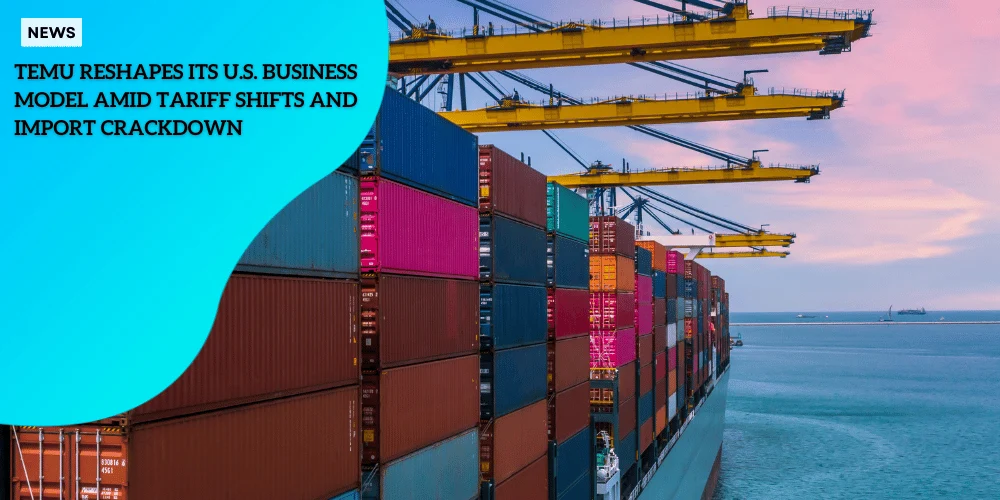Temu Reshapes Its U.S. Business Model Amid Tariff Shifts and Import Crackdown

Anúncios
What American Shoppers Should Know About Temu’s New Local Warehouse Strategy
In a major shift that reflects changing trade dynamics and rising import barriers, Chinese e-commerce giant Temu has restructured its U.S. operations.
Once known for shipping ultra-affordable goods directly from China, the company is now transitioning to a local fulfillment model, halting shipments from China and instead relying on warehouses located in the United States.
Anúncios
This move comes in the wake of the expiration of the de minimis exemption, a long-standing U.S. policy that allowed packages valued under $800 to enter the country duty-free.
Coupled with new tariffs on Chinese imports, this policy change has disrupted how low-cost international retailers operate in the American market.
Anúncios
A New Chapter for E-commerce: No More Direct Shipments from China
Temu’s decision to pause shipments from China marks a turning point not just for the platform, but for the entire cross-border e-commerce industry.
Until recently, most of Temu’s products were sent directly from factories and suppliers in China, bypassing U.S. tariffs thanks to the de minimis rule.
That loophole allowed the company to offer massive discounts on everything from electronics to fashion.
However, following a renewed push for trade protectionism, former President Donald Trump initiated efforts to close the loophole in February 2025.
While the rule’s enforcement was temporarily postponed due to overwhelmed customs operations and logistical concerns, the exemption ultimately expired just days before Temu’s business model pivot was announced.

Temu Confirms Transition to U.S.-Based Fulfillment
In a statement provided to USA Today, Temu emphasized that its pricing for American consumers would remain unchanged despite the logistics overhaul.
The company reassured users that:
“All sales in the U.S. are now handled by locally based sellers, with orders fulfilled from within the country.”
This change is visible across the platform.
Products now display a “Local Warehouse” tag, signaling that they are shipped from within the U.S. According to banners on Temu’s website, customers browsing this section will not face import duties, customs fees, or additional shipping charges.
For shoppers, this provides a smoother and faster checkout experience, free from the uncertainty of surprise fees and long shipping delays that were previously associated with international purchases.
Why This Shift Matters: The End of Duty-Free Imports
For years, the de minimis rule was a critical element in the rise of ultra-cheap e-commerce from China.
Online retailers like Temu and Shein could ship small parcels directly to U.S. consumers at extremely low costs, avoiding tariffs that American-made products had to pay.
This imbalance became a growing concern for U.S. manufacturers and lawmakers alike.
By eliminating that advantage, the U.S. government is seeking to level the playing field and bring more transparency and fairness to cross-border trade.
As a result, platforms that once depended on bypassing customs through de minimis shipments must now evolve or risk losing competitiveness.
American Warehousing: A New Logistics Challenge
While Temu’s new approach allows it to sidestep rising import costs, it also introduces new complexities.
Maintaining warehouses on U.S. soil involves significant overhead costs, including storage, staffing, shipping logistics, and inventory management.
These responsibilities must now be balanced with the company’s commitment to low prices.
Additionally, sourcing products domestically—or at least storing them in local facilities—requires greater coordination with U.S.-based third-party sellers and distribution partners.
Temu has acknowledged this need and confirmed that it is “actively recruiting U.S. sellers to join the platform,” aiming to expand its product offerings while supporting local small businesses.
Will Product Variety or Supply Be Affected?
Temu has not yet provided clear details about how this shift will impact the availability and diversity of products.
A large portion of its catalog—especially niche items, seasonal accessories, and low-cost electronics—originated from manufacturers in China.
Replacing this supply chain with domestic equivalents could prove challenging.
Consumers may notice temporary gaps in inventory or changes in product selection as the company reconfigures its logistics network.
However, by partnering with local sellers and warehousing popular items in advance, Temu may succeed in offering fast delivery without compromising too much on variety.
What Shoppers Should Look For
Customers shopping on Temu’s U.S. website are now encouraged to browse the “Local Warehouse” section for faster shipping and fee-free delivery.
Products listed in this category are clearly marked and come with a promise of:
-
🛍️No import duties or taxes
-
🛍️No customs delays
-
🛍️Faster domestic shipping times
This transparency is a welcome change for many users who previously faced multi-week delivery timelines and occasional unexpected charges when ordering international products.
Broader Industry Impact: Shein and Others May Follow
Temu’s move may serve as a harbinger of broader changes in the online retail landscape.
Rival fast-fashion retailer Shein, which has also relied heavily on the de minimis rule, warned its U.S. customers in April 2025 about possible price increases due to new trade policies.
As tariffs mount and the regulatory environment becomes more protectionist, international e-commerce brands will likely adopt similar localization strategies.
Shifting to local fulfillment may become essential for maintaining market share in the U.S., particularly as consumers grow more sensitive to delivery times and total cost at checkout.
Trade War Consequences: A New Reality for Global Sellers
The evolution of Temu’s logistics strategy illustrates the ripple effect of geopolitical shifts on global commerce.
The U.S.-China trade war has forced companies to rethink global supply chains, placing increased emphasis on reshoring and friend-shoring—strategies that prioritize domestic production or trade with allied countries.
While these changes aim to protect U.S. industries and reduce dependency on Chinese goods, they also challenge companies to remain agile and consumer-focused.
For e-commerce platforms, the ability to deliver quickly, cheaply, and reliably may now hinge on localized inventory and partnerships, rather than low-cost international sourcing.
Opportunities for U.S. Sellers and Small Businesses
Temu’s pivot to local warehousing may not only help the company maintain compliance with new regulations—it may also open doors for American entrepreneurs.
By inviting local sellers to list their products on the platform, Temu creates a new channel for small and mid-sized businesses to reach millions of U.S. customers.
In an increasingly competitive digital marketplace, this could provide a meaningful boost for domestic producers who struggle to compete with the low prices of overseas goods.
Moreover, it positions Temu as a potential ally in efforts to strengthen local economies and promote homegrown brands.
What’s Next for Temu?
As Temu enters this new phase of U.S. operations, several key questions remain:
-
🛍️Will prices stay low as the company absorbs new warehousing costs?
-
🛍️Can domestic supply chains match the scale and efficiency of Chinese production?
-
🛍️Will consumers embrace the change if it means shorter delivery times and fewer import hassles?
Only time will tell if the platform’s pivot will prove successful in the long run.
However, its willingness to adapt quickly shows that Temu remains committed to staying relevant in a highly dynamic market.
Conclusion: A Strategic Shift in a Changing Landscape
Temu’s operational transformation marks a significant shift in how global e-commerce platforms respond to policy changes and economic pressures.
By transitioning to U.S.-based fulfillment and local partnerships, the company seeks to preserve its value proposition while complying with tightening import regulations.
For American consumers, the change offers some clear benefits: no customs surprises, faster shipping, and continued access to affordable goods.
For Temu, it signals a broader evolution in strategy—one that could influence how digital retail functions in a post-globalization era.
As trade policies continue to evolve and economic nationalism gains momentum, localized logistics may become the new standard.
In this environment, companies like Temu must balance efficiency with adaptability—while staying focused on what matters most: the customer experience.






